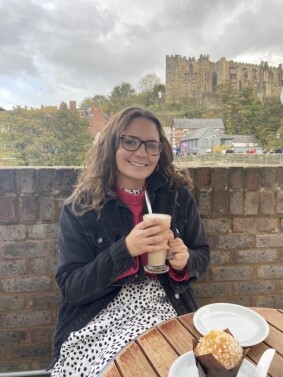Staff profile
Esther Outram
Postgraduate Research Student

| Affiliation |
|---|
| Postgraduate Research Student in the Department of Sociology |
| DCAD Fellow in the Durham Centre for Academic Development (DCAD) |
Biography
I am a PhD Sociology and Social Policy student in the Department of Sociology. I completed by BSc (Hons) Sociology and Social Policy at the University of Bath in 2019, where I completed a year-long placement as a Research Assistant in the Department of Education at the University of Oxford. I then joined the Sociology Department at Durham University in 2020 to complete my MA Social Research Methods (Social Policy).
Follow me on Twitter: @esther_outram
Field of Study
Why is no one talking about Disability? An Investigation into Grammar Schools and disabling barriers experienced by dyslexic pupils.
The UK grammar school system habitually produces winners and losers, and low socioeconomic pupils are disproportionately concentrated within the ‘losers’. Existing research highlights the structural inequalities and disadvantage experienced by low socioeconomic pupils in such selective education systems. Resultantly there is a significant underrepresentation of Free School Meal eligible pupils in Grammar Schools. Such research debunks the historic guise of the grammar school system enabling upward social mobility for academically oriented working-class pupils. A similarly stark underrepresentation of Special Educational Needs pupils exists in grammar schools, yet grammar school research has predominantly remained within the parameters of social-class and ignored disability.
This ESRC NINE DTP funded research proposes a mixed-methodology investigation into where dyslexic pupils fall in the grammar school winner/loser dichotomy. Quantitative secondary statistical analysis of National Government datasets and two-sets of qualitative interviews, with dyslexic pupils (aged 15-16) and eleven-plus/grammar school stakeholders, are planned.
This research has significant educational policy implications as it will: i) highlight potential disabling barriers experienced by dyslexic pupils, resulting in their predicted grammar school underrepresentation, ii) determine whether the eleven-plus is inherently discriminatory for dyslexic pupils, and iii) explore dyslexic pupils’ lived experiences of selective education systems, in comparison to non-selective comprehensive schools, and how this informs their academic self-concept and sense of belonging in the educational spaces they occupy.
This research will consider the intersectionality of disability and social-class, to explore the multi-faceted nature of barriers faced by low socioeconomic dyslexic pupils in selective education systems. Crucially, as a dyslexic individual myself, this research will hope to meaningfully include dyslexic voices in the conversation of social justice and grammar schools.
Research Group
- Higher Education and Social Inequalities (HESI)
Teaching
Seminar Leader for 'Societies in Transition' (SOCI1312)
Research interests
- Dyslexia and Neurodiversity
- Social Models of Dyselxia
- The Sociology of Education
- Academic Elite Educational Environments
- Academic Self-Concept
- Biographical Narratives

